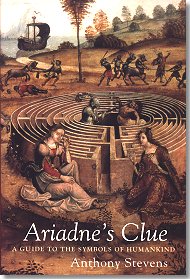Symbolism is the most powerful and ancient means of
communication available to humankind. For centuries human beings
everywhere have expressed their preoccupations and concerns through
symbolism in forms of myths, stories, religions and dreams, and the
meaning of symbols has long been the cause of argument among philosophers,
antiquarians, theologians, and, more recently, anthropologists and
psychologists.
In Ariadne's Clue distinguished analyst and psychiatrist Anthony Stevens
explores the nature of symbols and explains how and why we create the
symbols we do. Taking the ideas of C.G. Jung a stage further, Stevens
asserts that we not only possess an innate symbol-forming propensity which
exists as a creative and integral part of our psychic make-up, but also
that the human mind evolved this capacity as a result of selection
pressures encountered by our species in the course of its evolutionary
history. Stevens argues that symbol formation has an adaptive function: it
promotes our grasp on reality and in dreams often corrects deficient modes
of psychological functioning.
From the ancient symbol of the serpent to the archetypal masculine and
feminine, from the primordial landscape of the savannah to the mysterious
depths of the sea, Stevens elegantly traces a host of common symbols back
through time to reveal their psychodynamic functioning and looks at their
deep-rooted effects on the lives of modern men, women, and children.
Reviews
"Stevens has a unique capacity for relating myths and symbols
to the way our minds function today, thus bringing them alive rather than
dismissing them as historical curiosities. He has demonstrated that
symbolization is an essential part of the creative process and is neither
primitive nor escapist. If I had to pick out one outstanding feature, it
would be this capacity for integrating ancient and modern.
"Ultimately, as Stevens says, this is a book for browsing in rather
than for reading straight through; but anyone wishing to enlarge his
knowledge of symbolism will find what he needs in this original and
interesting book."
Anthony Storr, The Literary Review.
"One need not be a Jungian to appreciate this fine book as both a
reference and a contemporary introduction to symbolism. Psychiatrist
Stevens treats the specialist or lay reader to a brilliant integration of
psychological archetypes with Darwinian theory. Symbols, a 'natural
Esperanto', transcend ethnic and linguistic boundaries while absorbing and
reflecting cultural (as well as biological) influences. Stevens draws
heavily on Jung but goes beyond him, making effective use of philosophy,
semiotics, biology, and dream research. His 'Thesaurus' (over 300 pages)
is divided into four parts: Physical Environment; Culture and Psyche;
People, Animals and Plants; and The Body.
"Stevens presents vast learning easily and precisely in prose that is
at once calm and exciting. A bibliography rich with recent references, a
glossary, and a separate symbol index combine to make this a standard - if
not the standard - in the field; essential for most libraries."
E. James Lieberman, George Washington University School of Medicine,
Washington, DC., in The Library Journal.
"Considering symbols 'living entities with a life-cycle of their own'
(that is, their meanings evolve rather than remain fixed), Stevens (a
Jungian analyst and psychiatrist) begins this reference by exploring the
origins, psychology, and use of symbols. The Thesaurus that follows is
arranged thematically, and individual symbols are examined in detail. But
the author offers the caveat that individuals should examine their own
personal meanings for a particular symbol before reading what he has to
say about it. Small pen and ink illustrations enhance the
presentation."
Reference and Research Book News.
"Ariadne's Clue is probably the best available book on how to
approach our dreams. It is a look at the world of symbolism (the landscape
our dreams inhabit) and takes us deeply into the myths and traditions
which make various animals and plants, heroes and heroines, objects and
subjects, important to our inner selves. [Stevens] aims to show how our
understanding of the symbols of our dreams can actually make waking
reality more real, and how the dreams themselves help to adjust and
fine-tune us and the way we function."
Derek Parker, The Good Book Guide.
Availability
In print
Order this book online


|
|

|
|
